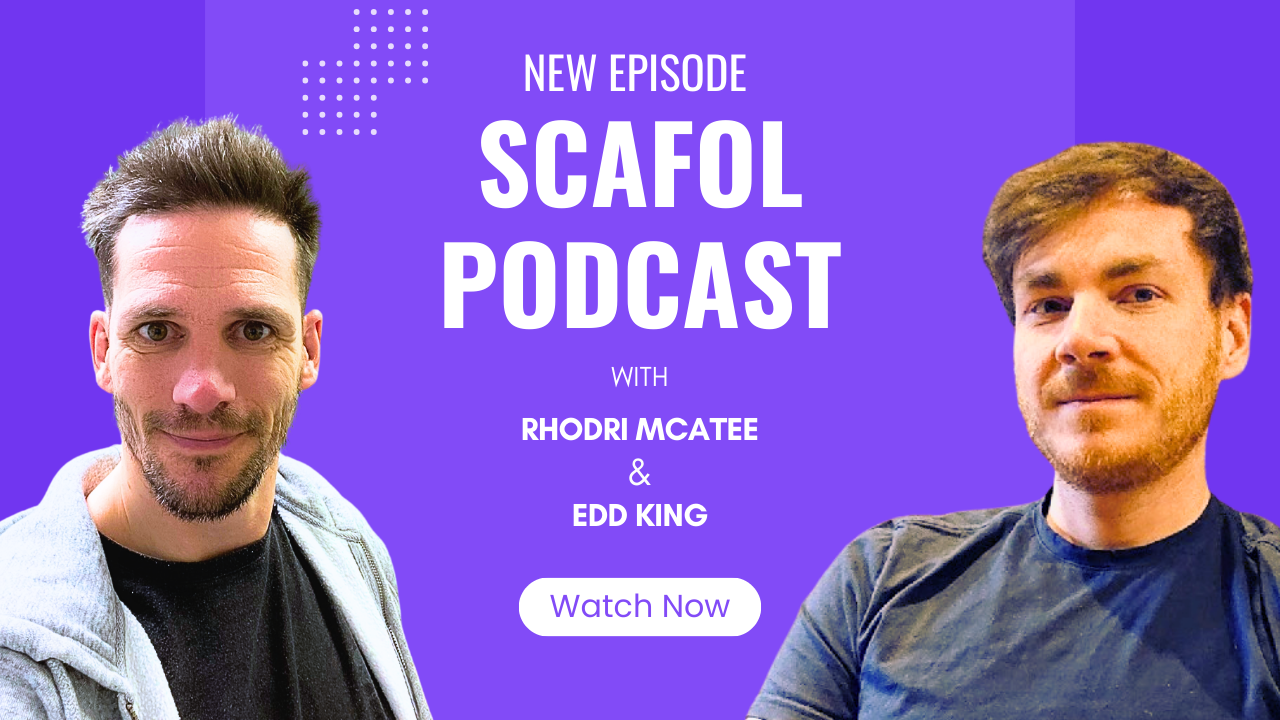Transcript
Hello and welcome to this week's Scafol podcast. Today I'm lucky enough to be joined by Edd King. Is it Edd or Edward?
Edd.
Edd. Fine. Edd with two D's. I see. Edd is a Taunton boy, Somerset. Left school and drifted into a job with Tesco's. Originally, if I'm correct, worked there for about 15 years and then at some point during the end of that 15-year period he decided he wanted to change his career path. And now he's a surveyor with home surveying, correct?
Yes.
Lovely to have you, Edd. Thank you very much. Let's start from the beginning. What motivated you to move from being a supermarket delivery driver to a career in surveying?
Yeah, there's nothing really any jobs in Tesco I didn't do. I did checkouts and shop floor, nights, stocking up shelves, the old classic. Drifted into the home shopping side of things, picking the orders and then the longest period I was the delivery driver. Going around all Devon, Dorset, Somerset, based out the Seaton store, so quite a big patch. Just drifting in my life basically after school. What motivated me was I always had a bit of an interest in properties, which is always a good starting point for being a surveyor.
As often in these great stories, one fateful night at a pub with my lifelong friend who works as a surveyor and valuer, he pulled me down the pub one evening. It’s like a 17th-century building or whatever and we're just sitting outside having a pint and pointing out things on the wall and saying, what's that over there? What's that? X and a metal X. What could that be causing? And we went from there. The whole evening sort of probing me, impressing me and said, you know what, you're a pretty analytical mind, you should maybe look at being a surveyor.
I was like, well, it's something. And yeah, just getting defects and guessing what could be and just going from there. From then on, really just every time I was out delivering houses I was looking at a crack or something going, I wonder what that is. It started the journey and then £15,000 later and three years later, after SAVA course, here I am practising surveyor.
It's amazing the life-changing decisions you can make after a couple of Guinnesses. What were some of the biggest challenges you faced in making such a significant career change and how did you overcome them? Because like you say, it's not a natural transition.
That's a good question because I was a bit of an academic at school. I wasn’t very good at it, but I liked geography and psychology stuff. So I had absolutely no construction knowledge. I knew what a wall was, I knew what a gutter was, basic maintenance things. But that was my biggest challenge, starting from absolute ground zero.
The second I got those books sent to me from SAVA, there I was flicking through the pages, trying to get ahead of the curve and reading, knowing full well I had to start from the very bottom and work my way up. I was lucky enough to have several surveyors around here. One, especially on a shout-out as well, chap called Paul Weil, took me out on many inspections every week and I learned a lot through him, just doing the job and firing him questions. The biggest challenge was absolutely the knowledge because I had none. I still don’t know anything, but at least I'm educated not to know anything. Now I do know a few things.
I like that disclaimer. Sometimes a blank canvas is a good place to start because you don’t necessarily have any preconceived ideas. When you've got that kind of fresh start, it could be seen as a strength in helping you with that career change.
That’s a good point.
Interesting question for you then. Skills transfer. Were there any skills or experiences you had as a delivery driver that helped you in your new role as a surveyor?
We'll have to go with that award-winning smile and that twinkle in the eye. I can talk to people. I’ve been used to going to people's houses for eight years as a delivery driver. Whilst not exactly transferable, I don't have the awkwardness of being at a house with someone while I'm doing a survey on it. I can talk to my clients almost as an equal, even though they’re talking to a professional. That makes it really easy to talk to me.
That’s such an underrated skill, particularly when you need to have pre- and post-inspection phone calls and to be able to speak to a client in a way they can understand—not full of jargon. It’s about outlining the fundamental issues and answering their questions on a level they can grasp. That ability to communicate is invaluable.
It’s really important.
The one I was thinking of wasn’t actually that one, despite your award-winning smile. It’s the travelling. As a surveyor, what kind of patch do you cover with your current company? Is it a small patch or does it involve a lot of driving?
A lot of the patch I do now is the same areas I used to cover for deliveries. I was based in the Seaton store, which is right on the coast, Lime Bay. The delivery patch from there—Exeter, Taunton, Bridgewater, Dorchester—it’s a big triangle around Taunton. Driving isn’t a problem. I just put on a good audiobook in the car and pay attention to the road.
Education and training—you mentioned you went on the SAVA course. For people considering SAVA or those currently studying, how did you manage to balance studying with your job at the time?
The big warning to anyone considering SAVA is it’s a huge time commitment. On paper, it says you need to allocate 10 to 20 hours a week and you think that’s manageable. But if you have a full-time job or family, it adds up quickly. You lose weekends and a lot of your free time.
I was fortunate. I don’t have a wife or kids, so my time was my own after work. Even then, I had to sacrifice weekends, study before work and sometimes catch up during work. Towards the end of my time at Tesco, I stopped being a delivery driver and moved to in-store home shopping, which gave me quieter moments to sneak in some study time.
Now that you’re a surveyor, is it everything you expected it to be? Are you happy with your decision?
Yes, I’m happy. It’s an odd transition going from doing case studies for SAVA to suddenly practising and doing it live for clients who rely on your advice for the biggest purchase of their lives. That was a “wow” moment for me. But I enjoy helping people and hearing them say, “Thank you for finding that defect,” or “You’ve saved me a fortune.” It’s a rewarding job and I don’t regret it at all.
You mentioned the SAVA Study Group earlier. Can you tell us more about that?
The SAVA Study Group started as a small WhatsApp group where students could share ideas and support each other. Over time, it grew into a larger community with over 300 members, including students and qualified surveyors. We hold regular live sessions on topics like report writing or assessment preparation and we share resources through a Google Drive.
It’s not about teaching—that’s SAVA’s job—but rather guiding and reassuring students. It’s a safe space where people can ask questions and share their progress and it’s been one of the proudest things I’ve been part of.
Final question: What advice would you give to someone considering a career change to surveying?
Do your research and plan ahead. The SAVA diploma is an accessible route, but it’s a big time commitment and you need to make sure you can dedicate the time. Shadow a surveyor if you can and see if the work suits you before committing. It’s not a job for someone who wants to stay indoors. You’ll be crawling through lofts and trudging through muddy fields.
That said, it’s incredibly rewarding. There’s nothing like solving a tricky defect or helping a client avoid a costly mistake. If I can do it with no construction background, anyone can.
Thank you, Edd, for joining us on the Scafol podcast. Your journey is inspiring and I’m sure it will resonate with a lot of listeners.
Thank you, Rhodri. It’s been a pleasure.


















 Book a Demo
Book a Demo